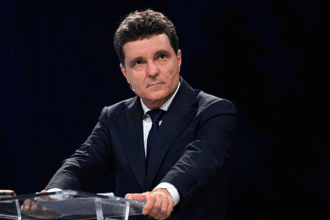In Moldova’s recent parliamentary vote, and Pro-European Party of Action and Solidarity (PAS) won a commanding lead despite serious allegations of external interference. With the count of about half the ballot papers, the PAS reached 50% of the vote, which was far ahead of the Pro Ooy Russian patriotic block. The turnout reached 52%, suggesting high public engagement. The result is closely seen as a test of the future direction of the country.
President Mia Sandu had previously warned of “massive Russian intervention” and implied a choice as an important alternative between European and Moscow influence. Meanwhile, opposition claims and bomb threats came to light during voting, increasing tension in Chisinau and among migrant people. The investigation and conflict on validity also began.
What Vote Margins Is PAS Achieving?
With most votes tallied, PAS leads by a solid margin — roughly double that of its main opponent. The results suggest the party may capture 55 seats in the 101‑member parliament, giving it a potential majority without alliances.
By contrast, the Patriotic Electoral Bloc trails with under 25%. In past elections, PAS had gained around 52.8% of the vote; this time, it looks poised to retain dominance without needing support from other blocs. Here is the link to our article on the McGregor Election Withdrawal.
Who’s Challenging the Results?
One prominent rival, Igor Dodon, prematurely claimed victory and urged mass protests at parliament. He held that opposition parties should reject any PAS win, alleging manipulations. Meanwhile, authorities arrested three members of Dodon’s bloc on suspicion of inciting unrest. They accused Moscow‑aligned criminal groups of coordinating disruptions.
In parallel, bomb threats were reported at polling sites not only in Moldova but also in Italy, Romania, Spain, and the U.S., complicating the election environment.
Is the Interference Real?
Yes. Authorities and independent observers documented widespread attempts to influence the vote. These included cyber‑attacks, disinformation campaigns, and illicit funding routed through social media. Some pro‑Russian parties were disqualified days before the election over suspected illegal financing.
PAS leadership has repeatedly cited foreign meddling as an existential threat. They argue that Moldova is winning its right to a European path despite these pressures. Here is the link to our article on the Biden Election Dispute.
What Role Does Transnistria Play?
A breakaway region along Moldova’s border with Ukraine, Transnistria maintains strong pro‑Russian sentiment and hosts a Russian military presence. Residents often hold Moldovan passports, yet many report facing restrictions while voting. Opposition leaders claimed there were coordination efforts to prevent Transnistrian polling.
Nonetheless, some citizens traveled significant distances to vote. Long queues formed near border polling stations, raising questions about accessibility and fairness.
Can PAS Govern Alone and Deliver on Its Promises?
With a projected absolute majority, PAS is unlikely to need coalition partners. The party can now push its agenda unilaterally — further EU integration, reforms, and anti‑corruption measures.
They also vow to counter interference aggressively, upgrading digital security, launching inquiries, and prosecuting manipulators.
Yet challenges remain: inflation, energy supply, and political polarization may test governing stability.
Final Thoughts
Moldova election intervention saga shows how modern competition battlegrounds are not only of votes, but also of narratives and influences. Despite the continuous pressure, the PAS is prevalent, Moldova’s European trajectory has been reconfirmed – although the way forward will demand vigilance, transparency, and reforms at the front, which is to protect sovereignty from secret care.








